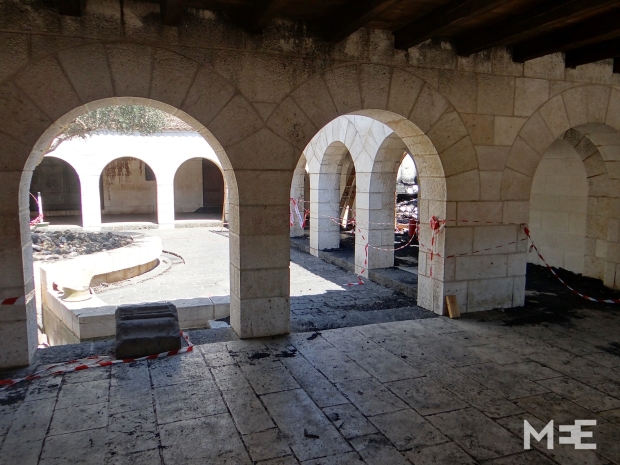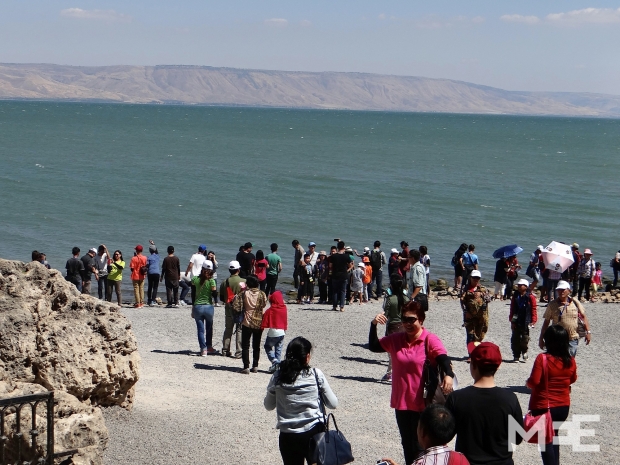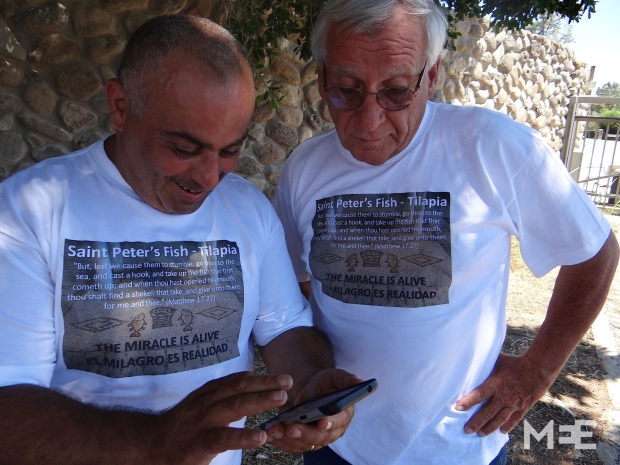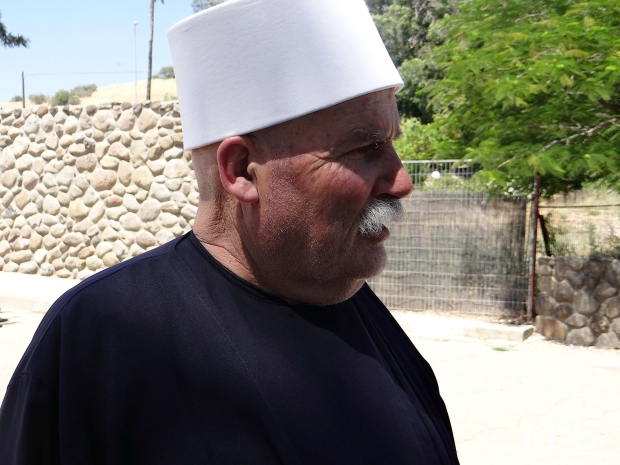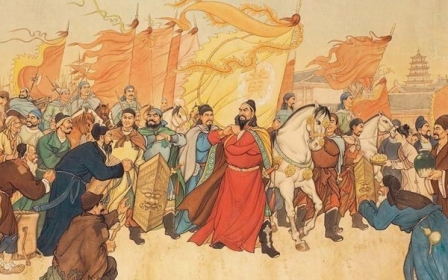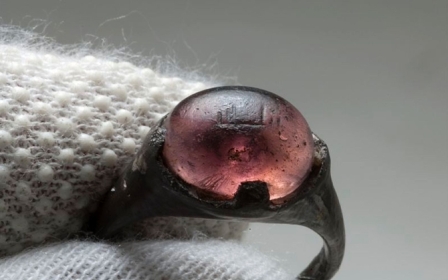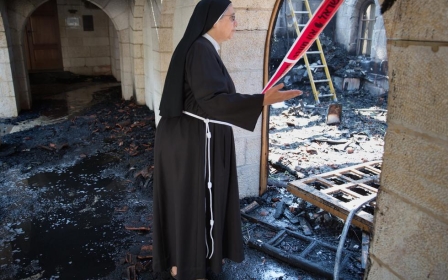Palestinian Christians sceptical as Israeli police 'investigate' church attack
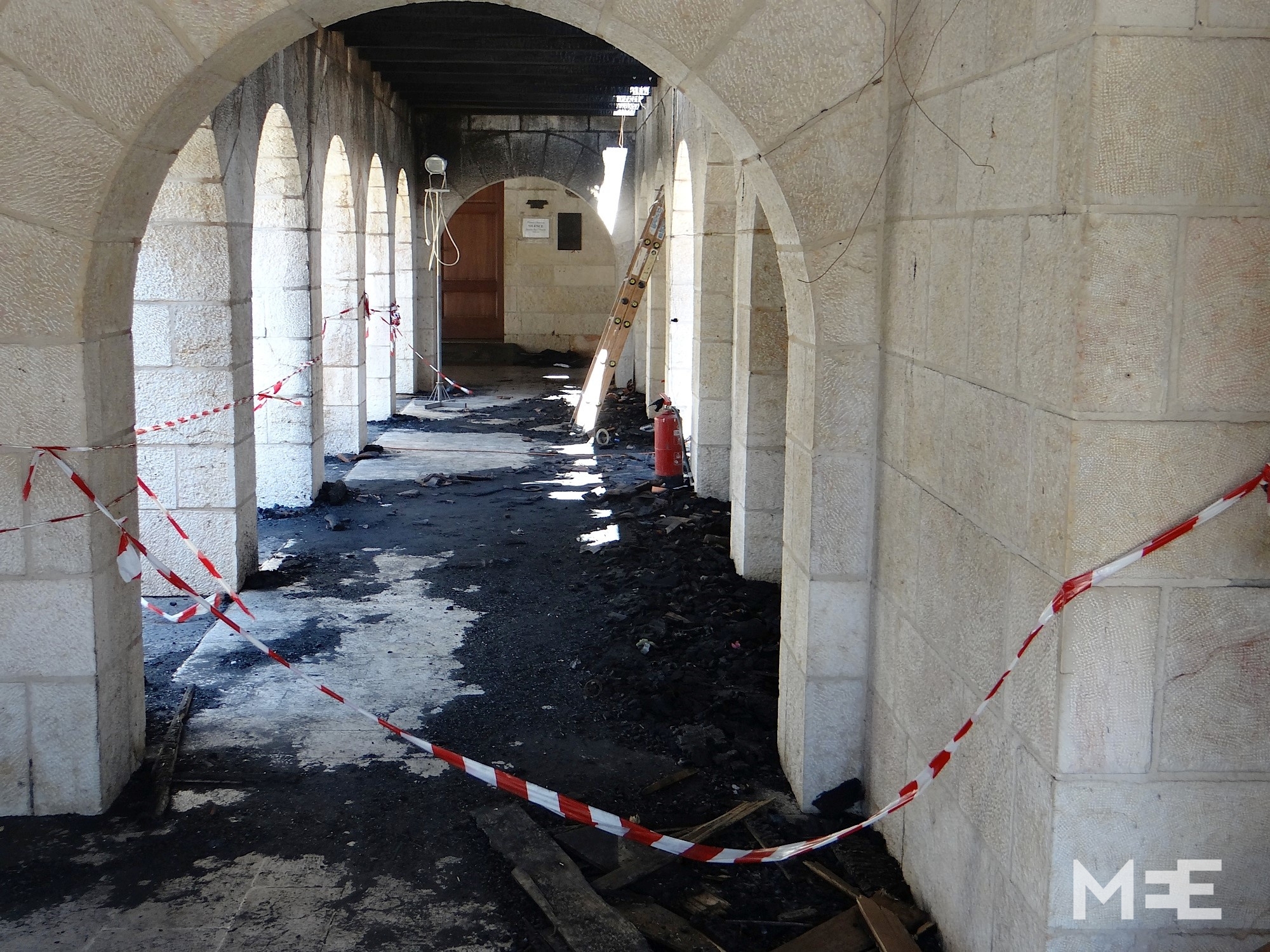
TABGHA, Israel - This is a tale about hatred, shame and… fish. In the early morning of 17 June a group of intruders broke into the Church of the Multiplication of the Loaves and Fish in Tabgha, on the shore of the Sea of Galilee. They tried to set fire to various parts of the building, burned bibles and other religious books, made a roof partially collapse, damaged the interior and wrote on the walls: "False idols will be smashed," "Death to non-Jews," and verses from the Torah referring to "gentiles".
A few days after the incident took place a strong burning smell still lingered on. At first the Palestinian hausmeister, who keeps guard at the site, didn't want to open the gate to let journalists in. “Police and insurance officers want the place to remain cordoned off,” he said. But when Middle East Eye asked him about the details of the incident, he allowed us in to take a few pictures.
“I was here when the fire broke out. It happened at a quarter past three in the morning. One of the German monks heard some noise and got out of bed. He raised the alarm, called for help and tried to extinguish one of the two fires that were blazing.“
There is no doubt this was a hate crime and it was condemned as such by the Israeli government, prime minister and president. The Israeli newspaper Haaretz called the church arson a "terrorist act" and criticised the government for not doing more against Jewish religious fanatics.
“The government of Israel, rightfully, wouldn’t have ignored the torching of synagogues, the destruction of tombstones in Jewish cemeteries or assaults against Jews in other countries if governments were lax in investigating such crimes,” the newspaper said. Haaretz called on the Israeli government to “uproot such hate crimes from areas under its jurisdiction”.
The hausmeister is sceptical about the official Israeli condemnations. “We've had 43 attacks on churches, monasteries and mosques in the last four years and the police have not arrested anybody until now," he said. "They sometimes take some youngsters for interrogation, to be released almost immediately. There have been incidents like pig’s heads thrown into mosques and vandals scrawling hate messages on the monastery in Latroun, near Jerusalem.”
He lowered his voice. “They wrote: 'Jesus is a monkey' and 'Mary is a cow'."
Who are "they"? The hausmeister gives a scornful laugh. “We don’t know for sure but have a strong suspicion: they are young Jewish fanatics, probably from a settlement near Nablus. Last year they came to our outdoor prayer area. Schoolboys with their teachers. They destroyed a cross and threw it into the lake. They smashed some chairs and benches. It was in June last year, exactly one year ago.
"We think the aggression against the church this week was perpetrated by two or three individuals. We gave the details of their car’s license plate to the police. The police took pictures of the damage, but up until now we haven’t heard from them.”
A place of Christian pilgrimage
“It’s not only a religious attraction. It’s a human attraction," said businessman Israel Snir. He took a plane for Israel from San Pedro Sula, Honduras, when he heard about the incident in Tabgha. As a secular Jew, Snir does not take literally the biblical story about Jesus’ miracle, feeding a crowd of 5,000 men, women and children with only five loaves of bread. All four gospels – Matthew, Mark, Luke and John - recount the tale of the multiplication of loaves and fish.
It certainly is an attraction nowadays: one of the most visited Christian places of pilgrimage in Israel, in spite of the fact that the New Testament does not reveal where the miracle actually took place. The early Christians believed the site of the story was the northwestern tip of the Sea of Galilee, near the village of Capernaum.
In the Fourth Century a church was built at the site and pilgrims came from far away to pray at this holy place. A larger Byzantine church, built two centuries later, was famous because of its rich mosaics. In the Seventh Century invading Persian and Arab armies destroyed this church.
More than 1,000 years later, at the beginning of the 20th Century, German archaeologists found the outline of the church, the altar and the famous Byzantine mosaic of the loaves and fish. In 1933 a wooden structure was erected above the excavated Byzantine foundations and the mosaics.
In 1948 the Jewish Haganah militia destroyed the Palestinian village of Tabgha (the Arabised version of the original Greek name Heptapegon), expelled the 300 or so inhabitants, but spared the archaeological site. In 1982 a new, beautiful church was built at the site, attracting hundreds of tourists and pilgrims daily.
“When you see a holy place burnt out, caused by hatred - ” Snir hesitates. “What can I say? I feel ashamed.” Snir feels attached to the place, not only because of its beauty and magical atmosphere, but also because of the tilapia - the freshwater fish that has swum here since time immemorial.
He made his fortune in the tilapia aquaculture and the fish processing industry in Honduras and other Latin American countries. “The tilapia or Saint Peter’s Fish comes originally from the Sea of Galilee. It was a fish already caught in biblical times. Nowadays the tilapia is cultivated and consumed in more than a hundred countries worldwide.”
To offer his condolences to Tabgha’s monastic community and the Palestinian Christians of the Galilee, Snir donated a large consignment of fish and loaves to the clergy. He also had t-shirts made with the text "The Miracle is Alive" and a verse from Matthew referring to a fish with money in his mouth.
Dreams of fish miracles may have brought Snir commercial success, but his Zionist dream lies in tatters. “My father came here from Poland," he said. "He left home when he was 16 years old. You know when he left? The first of September 1939: the day the Germans invaded Poland. He walked 250 kilometres, from Tarnow to Ternopol in modern-day Ukraine, in order to escape. There he was caught by Stalin’s Red Army and thrown in a gulag for three years. When the war was over he came to this country because he believed there was no place anymore for Jews in Europe. My father wasn’t religious at all. He just wanted safety for him and his family.
“My mother was born in 1926 in Vienna. When she was 12 her father was able to get her on the last train out of Austria, out of the hands of the Nazis. She never saw her family again. She left to escape the pogroms, the hate and intolerance. What does this incident in Tabgha remind you of?”
A Palestinian employee of the monastery, who did not want to be named, recalls that on Sunday after the incident around 6,000 Christians, Druze and Muslims from the Galilee came to Tabgha to protest the desecration. There is a strong feeling that the vandalism is not only fuelled by a Jewish extremist view of Christianity as idolatry, but also by strong hostility against the Palestinian community in Israel.
“We give the police a few days to prove that they are taking this issue serious,” the man said. “People are very angry and if nothing is done there could be more protests in the months ahead.”
While that man was speaking, a Druze sheikh approached the church to have a look at the damage and offer his condolences to the Christian clergy. Sheikh Amin Kanaan from the village of Kafr Yarkaj calls the incident “a crime against humanity”.
“There is no difference between a Christian, Muslim, Druze or Jewish place of prayer and worship," said the sheikh. "We are all praying to the same God.”
Back in Jerusalem, worshipping “the same God” does not prevent extremists committing hostile acts.
“Some of them hate Christians and Muslims; they want all Palestinians to leave.”
For the Palestinian manager of Bint al Balad, a small eatery near the New Gate in the Old City of Jerusalem’s Christian quarter, the incident in Tabgha doesn’t come as a surprise.
“We have had similar incidents here in East Jerusalem. The monks of Dormition Abbey, who belong like their German colleagues in Tabgha to the Benedictines, have been spat at and verbally abused. Jewish extremists wrote hostile slogans on the walls of the abbey.”
The restaurant manager fears the incidents will cause an economic backlash. “Most of the tourists who come to the Old City of Jerusalem are pilgrims or at least religiously interested. They will stay away. This is also disadvantageous for Israel.”
But the man says he hasn't contemplated leaving. “I’m a Christian Palestinian. I’m like a fish that will die outside the water. This is my homeland and I will stay. Outside Palestine, I’ll die.”
New MEE newsletter: Jerusalem Dispatch
Sign up to get the latest insights and analysis on Israel-Palestine, alongside Turkey Unpacked and other MEE newsletters
Middle East Eye delivers independent and unrivalled coverage and analysis of the Middle East, North Africa and beyond. To learn more about republishing this content and the associated fees, please fill out this form. More about MEE can be found here.


